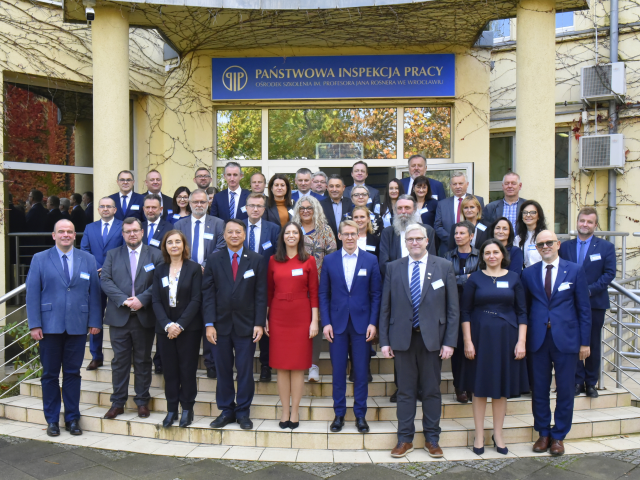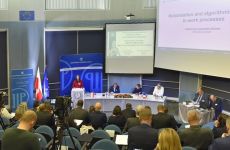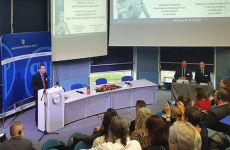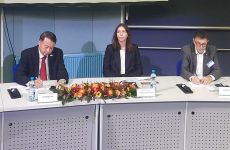
“Labour inspection and the challenges of the future” – This was the title of the international conference organised by the NLI on 27 and 28 October 2022 at the NLI Training Centre in Wrocław. The event brought together representatives of labour inspectorates from EU Member States and of the International Association of Labour Inspection (IALI), the International Social Security Association (ISSA), the International Labour Organisation, the Senior Labour Inspectors’ Committee (SLIC) and the European Agency for Safety and Health at Work. The meeting reflected on present and future labour market challenges and provided an opportunity to exchange experiences related to inspection and prevention activities in Europe and worldwide.
The conference was opened by the Chief Labour Inspector, Katarzyna Łażewska-Hrycko, and the President of the International Association of Labour Inspection, Ho Siong Hin. The Chief Labour Inspector then read out a letter from the Speaker of the Sejm of the Republic of Poland, Elżbieta Witek, who emphasised the importance of innovative solutions contributing to the improvement of safety and quality of working conditions.
The lectures scheduled in the conference programme were divided into two thematic blocks: experiences of national labour inspections in the context of present and future challenges of the world of labour, and recommendations and support from international organisations and institutions.
On the first day, the conference began with the presentation of Maria Fernanda Ferreira Campos, General Inspector from the Authority for Working Conditions of Portugal, who introduced the issues related to teleworking and presented how Portuguese health and safety services and labour inspectorates approach the topic. Mark Cullen, Assistant Chief Executive Officer of the Irish Health and Safety Authority, spoke about the challenges faced by labour inspectors in Ireland in relation to the increasing prevalence of hybrid working.
Katarzyna Łażewska-Hrycko then spoke about automation, robotisation and algorithmisation of work processes. She discussed how the use of new technologies by establishments improves safety and the quality of work. In doing so, she drew attention to emerging risks for which the authorities responsible for health and safety and the protection of workers' rights will have to prepare and will probably have to begin to carry out supervision of working conditions in a completely different way than before. Arto Teronen, Director of Field Operations from the Department for Work and Gender Equality, Ministry of Social Affairs and Health, Finland, addressed the impact of psychosocial factors on workers' health and quality of work in his presentation. He spoke about the study of these risks by means of a questionnaire used by occupational health and safety authorities in Finland.
The fifth lecture was given by Chief Advisor Annemarie Kndusen and Special Advisor Stine Hvid Bern from the Danish Working Environment Authority. They discussed the issues related to inspections of digital platforms. The organisation of work is different and varies from industry to industry, this in turn poses another challenge for working environment inspections. The Danish authority has little experience in carrying out inspections of people working in this way, but has launched a campaign targeting platform workers providing courier services. Meanwhile, guests from France – Agnès Glas, Project Manager of the European and International Affairs for Labour Inspectorate from the General Directorate for Labour, and Bernard Martin, inter-regional maritime referent of the Regional Directorate of Labour of Brittany – gave an insight into the challenges during inspections at offshore wind turbine sites. Denitsa Ivanova Nikolova, Chief Labour Inspector from the General Labour Inspectorate Executive Agency of Bulgaria, spoke about the challenges of the digitalisation of work and the use of artificial intelligence in various areas of the economy. She was accompanied by Pavlin Vaskov Todorov, Director of the Labour Inspectorate Directorate of Burgas. The day ended with a panel discussion during which the speakers answered questions posted by the participants.
Five lectures were scheduled for the second day of the international meeting. Charlotte Grevfors-Ernoult, Chair of the SLIC Committee, presented relevant aspects of the EU Strategic Framework for OSH 2021-2027 from an EU enforcement perspective.
IALI President Ho Siong Hin then presented a framework for measuring the performance of labour inspections in the area of OSH. Chief of the Labour Administration, Labour Inspection and Occupational Safety and Health from the International Labour Organisation Joaquim Pintado Nunes, remotely attending the conference, pointed out that the environment in which labour inspectorates operate is constantly changing and discussed the ILO guidelines for labour inspections. The penultimate speaker was Ioannis Anyfantis, Project Manager from EU-OSHA's Prevention and Research Unit, who introduced participants to the role of state influence on OSH compliance and what opportunities and challenges arise in relation to enforcement. The last speaker was Helmut Ehnes, Chairman of the ISSA VISION ZERO Steering Committee. He spoke about implementing a preventive mindset in industry by Vision Zero. The meeting concluded with a panel discussion which included all the speakers of the second day of the conference.
Video coverage of the International Conference "Labour Inspection and the Challenges of the Future":


